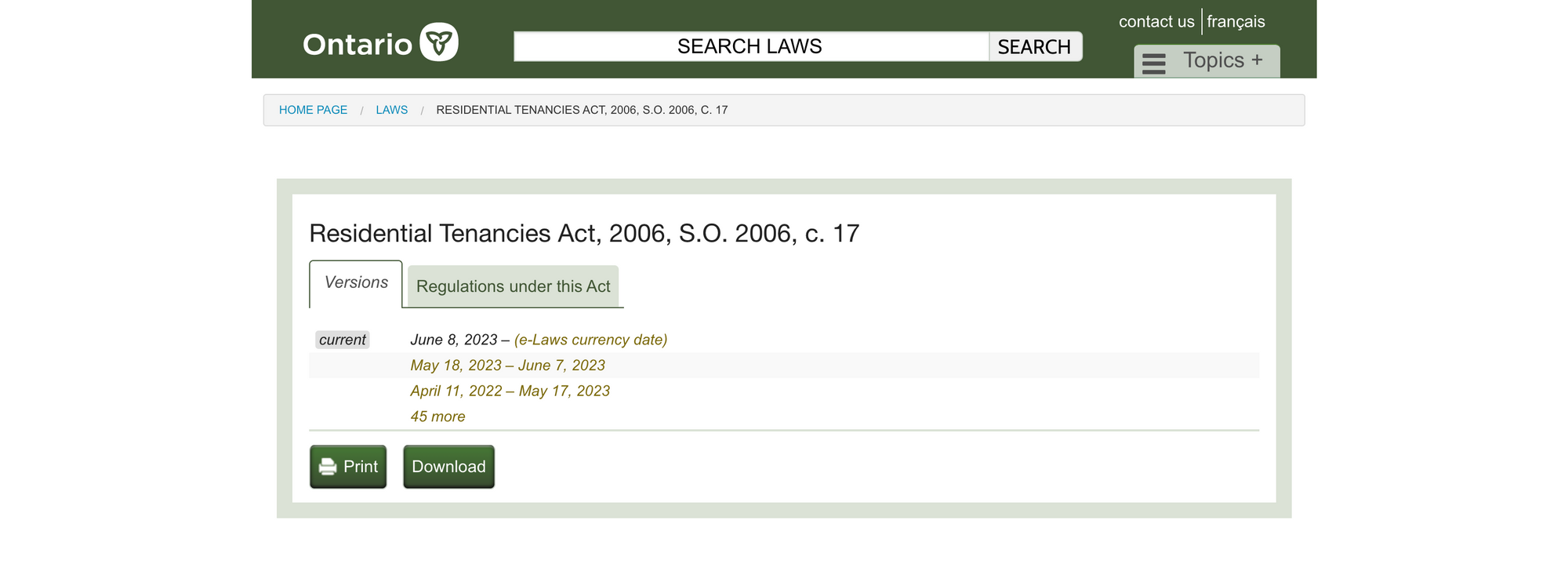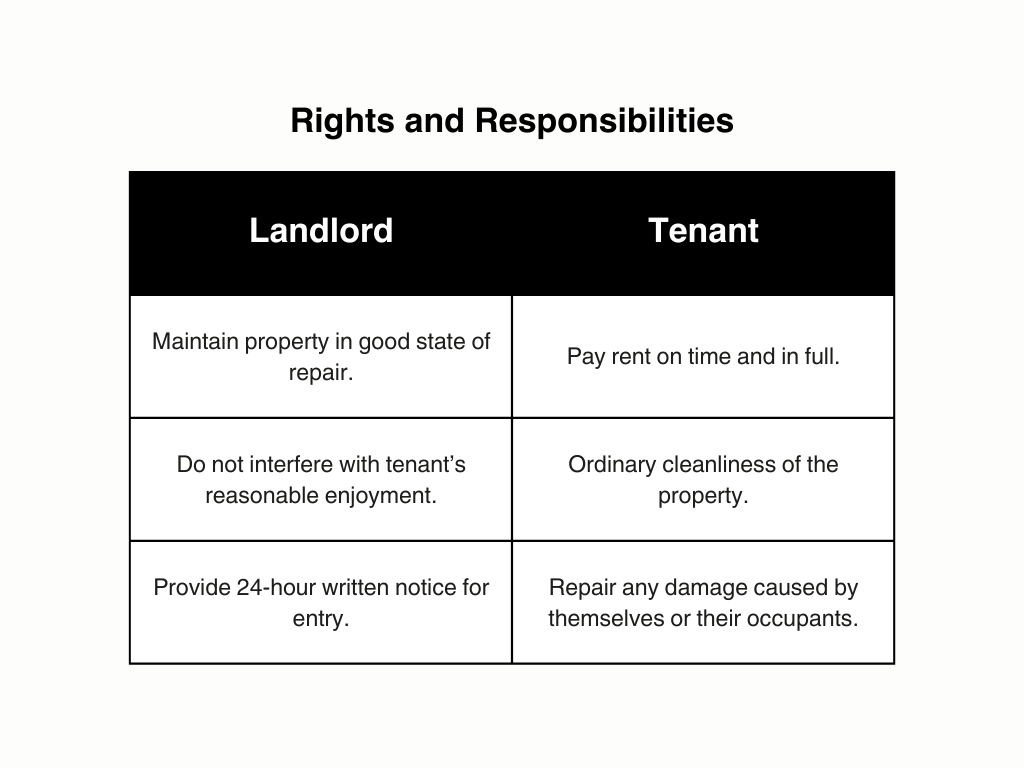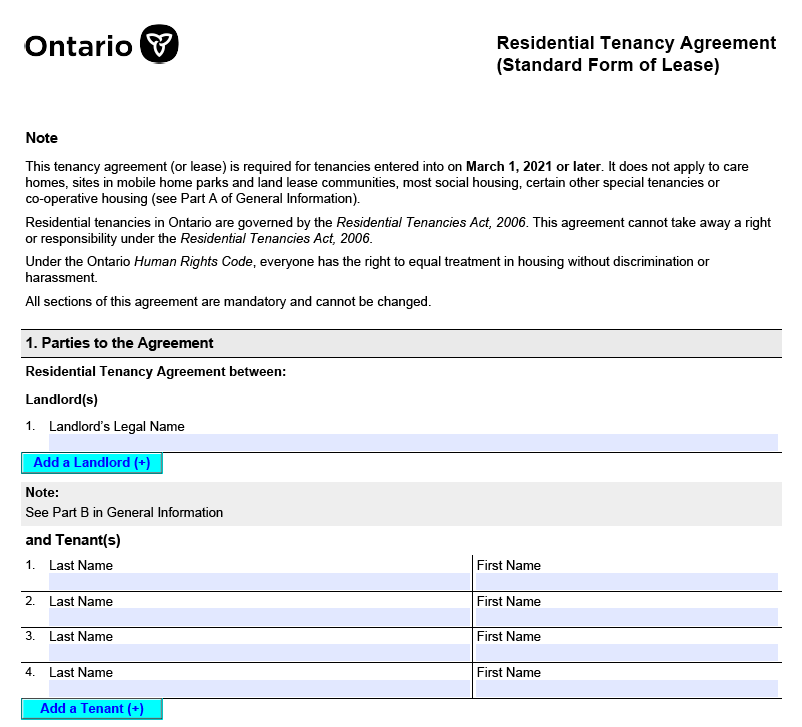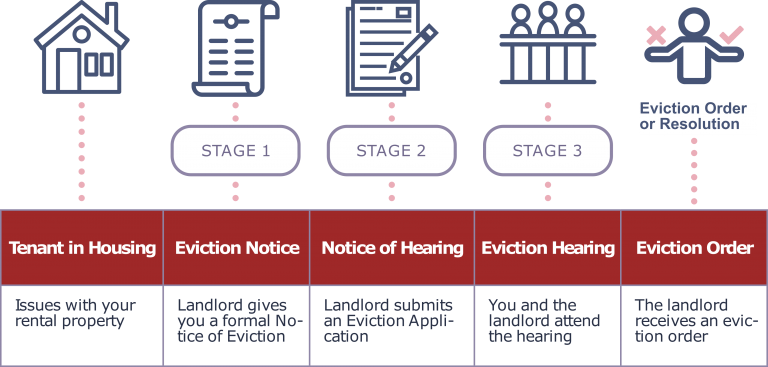Landlord and Tenant Disputes: 2024 Ontario Guide

Landlord Tenant Lawyer
When do you actually need a landlord and tenant lawyer?
Some tenancy disputes can be resolved with good communication and common sense. Other times, experienced and timely legal representation can save you thousands of dollars.
Let's take a closer look at the information you need to know when dealing with a landlord and tenant dispute - the legal terms, rights and responsibilities, and most importantly, when you should hire a lawyer.
Understanding Landlord and Tenant Law
Landlord and tenant law refers to the legal relationship between a property owner (landlord) and the any individual who rents or leases the property (tenant). In Ontario, this relationship is governed by the Residential Tenancies Act.

Key Legal Terms
This following is a list of key legal terms, as defined by the Residential Tenancies Act. Their precise definitions are important when dealing with a landlord and tenant dispute:
- Landlord: the owner of a rental unit or any other person who permits occupancy of a rental unit, other than a tenant who occupies a rental unit in a residential complex and who permits another person to also occupy the unit or any part of the unit.
- Tenant: a person who pays rent in return for the right to occupy a rental unit and includes the tenant’s heirs, assigns and personal representatives, but “tenant” does not include a person who has the right to occupy a rental unit by virtue of being a co-owner of the residential complex in which the rental unit is located, or a shareholder of a corporation that owns the residential complex.
- Tenancy Agreement: a written, oral or implied agreement between a tenant and a landlord for occupancy of a rental unit and includes a licence to occupy a rental unit.
- Rent: the amount of any consideration paid or given or required to be paid or given by or on behalf of a tenant to a landlord or the landlord’s agent for the right to occupy a rental unit and for any services and facilities and any privilege, accommodation or thing that the landlord provides for the tenant in respect of the occupancy of the rental unit, whether or not a separate charge is made for services and facilities or for the privilege, accommodation or thing.
- Rental Unit: any living accommodation used or intended for use as rented residential premises, and “rental unit” includes, a site for a mobile home or site on which there is a land lease home used or intended for use as rented residential premises, and a room in a boarding house, rooming house or lodging house and a unit in a care home.
- Utilities: heat, electricity and water.
- Vital Service: hot or cold water, fuel, electricity, gas or, during the part of each year prescribed by the regulations, heat.
Common Disputes Between Landlords and Tenants
Despite best intentions, disputes between landlords and tenants inevitably arise. Understanding the most frequent conflicts will help you resolve disputes more effectively and help prevent them from happening in the future.
- Nonpayment of Rent/Late Rent Payments: By far the most common dispute. Various factors can contribute to tenants struggling with rent, such as illness, job loss, or unexpected expenses. This can create a domino effect since Landlords also have financial obligations to consider including mortgage payments and property taxes. It's crucial to determine whether this issue can be resolved with compassion and a payment plan or if immediate legal action is necessary to avoid significant financial losses.
- Maintenance Issues: Maintenance and repairs often lead to disputes between landlords and tenants. Landlords have a duty to provide a safe living environment and tenants are responsible for keeping the property clean and avoiding damage. Effective communication, proper documentation, and timely action are crucial to ensuring each party understands their obligations.
- Deposit Disputes: In Ontario, only rent deposits and key deposits are allowed under the Residential Tenancies Act. Other types of deposits, such as security deposits, damage deposits, or pet deposits, are illegal. Rent deposits must be returned in full or used for the final month's rent - and interest is payable to the tenant. Landlords cannot withhold any portion of the deposit for damage or cleaning.
Rights and Responsibilities of Landlords and Tenants
It is important for both landlords and tenants to understand their rights and responsibilities in order to avoid disputes. Below are a few key rights and responsibilities that landlords and tenants must follow according to the Residential Tenancies Act.

Landlord's Responsibilities:
- A landlord is responsible for maintaining the rental complex and/or unit in a good state of repair and fit for habitation, complying with health, safety, housing and maintenance standards - RTA Section 20(1).
- A Landlord is prohibited from interfering with the reasonable enjoyment of a rental unit by tenants or members of their household and shall not harass, obstruct, coerce, threaten or interfere with a tenant - RTA Section 22 & 23.
- A landlord must provide 24 hour written notice to enter an occupied rental unit. Exceptions are allowed for cases of emergencies and with tenant consent - RTA Section 26 (1) & 27 (1).
Tenant's Responsibilities:
- A tenant is responsible for paying rent on time, and in full, and shall not withhold rent for any reason, except in accordance with the provisions of Section 12.1 - RTA 12.1(6).
- A tenant is responsible for ordinary cleanliness of the rental unit, except to the extent that the tenancy agreement requires the landlord to clean it - RTA Section 33.
- A tenant is responsible for repairing any damage to the rental unit caused by their own intentional or negligent actions, as well as the actions of other occupants or individuals allowed on the premises by the tenant - RTA Section 34.
Landlord Tenant Lawyer
The Residential Lease Agreement
The lease agreement (or tenancy agreement) is a legally binding document that outlines the terms and conditions of the tenancy between the landlord and tenant. It is important for both parties to carefully review and understand the lease agreement before signing it.
Ontario Standard Form of Lease
In Ontario, there is a standard form lease agreement that must be used for any new tenancy created after March 1, 2021. This agreement is available on the Ontario website here.

Tenant Selection
Before entering into a lease agreement, a landlord can choose a tenant based on income information, credit checks, credit references, rental history, guarantees.
A landlord is allowed to ask a potential tenant:
- what their income is
- if they work, and where they work
- how many people will be living with them
- the names of people who will be living with them
- if they have pets
- if they smoke
- permission to do a credit check (requiring: full name, date of birth, current address)
- references from past landlords
- in some cases, if they have a guarantor or co-signer
A landlord is not allowed to ask a potential tenant:
- if they are pregnant or have children
- if they plan to have children, or if they plan to have more children
- if they are married, single, or divorced
- their religion or ethnic background
- their sexual orientation
- if they get welfare or other public assistance
- if they have a disability
- their age (even if they are 16 or 17 as long as they are living away from their parents)
- if they are a Canadian citizen
Legal Remedies and Processes
In the event that a landlord and tenant dispute arises, there are legal options available to both parties. To successfully navigate the process, it is essential to comprehend its workings, explore available options, and understand the legal requirements.
Landlord Tenant Lawyer
The Landlord and Tenant Board
In Ontario, all residential tenancy disputes are resolved through the Landlord and Tenant Board (LTB). This provincial Tribunal has the sole function of resolving disputes between residential landlords and tenants.
The LTB operates under the legal framework provided by the Residential Tenancies Act. The scope of their authority includes a wide range of issues such as eviction notices, rent increases, repairs, and maintenance problems.
When a dispute arises, both the landlord and the tenant have the right to apply to the LTB. The process begins with a notice, followed by an application, and finally a hearing where both parties present their case. The LTB adjudicator then makes a decision based on the facts and the law. This decision is legally binding and enforceable.

Forms and Applications
The LTB has very strict rules when it comes to initiating proceedings. Both landlords and tenants must carefully follow procedures and use the correct forms to initiate the intended legal remedy. If a form is not completed correctly, it can result in the application being rejected.
The LTB provides a database of forms and applications for landlords and tenants to use here.
The most commonly used forms by Landlords are:
- N1: Notice of Rent Increase
- Form N4: Notice to End a Tenancy Early for Non-payment of Rent
- Form N5: Notice to End your Tenancy for Interfering with Others, Damage or Overcrowding
- N12: Notice to End your Tenancy Because the Landlord, a Purchaser or a Family Member Requires the Rental Unit
- Form L1: Application to Evict a Tenant for Non-Payment of Rent and to Collect the Rent the Tenant Owes
The most commonly used forms by Tenants are:
- N9: Tenant’s Notice to End the Tenancy
- N11: Agreement to End the Tenancy
- T1: Tenant Application for a Rebate
- T5: Tenant Application – Landlord Gave a Notice of Termination in Bad Faith
- T6: Tenant Application about Maintenance
Evidence and Documentation
In any landlord and tenant dispute, having thorough and accurate documentation is crucial. This includes well-drafted lease agreements, detailed rent receipts, evidence of clear and consistent communication, and any other relevant supporting documents.
The party who presents the most organized and complete evidence usually has the better chance of succeeding in front of the LTB.
A lawyer can assist in determining, gathering, and organizing this information in a way that presents a strong case before the LTB. They can also advise on what evidence is relevant and admissible, helping to eliminate any unnecessary or inadmissible information.
Hiring a Landlord and Tenant Lawyer
When there is a dispute between a landlord and tenant, seeking legal counsel should always be the first and foremost consideration.
Even in situations where the matter can potentially be resolved without formal LTB proceedings, it is crucial to have a full understanding of your rights and obligations. This will prevent any actions or decisions that could prejudice or harm your own position.
An experienced lawyer will carefully outline the available options and risks involved in order to resolve the dispute effectively. They will determine the necessary steps to be taken, ensuring every action is in full compliance with the RTA and LTB guidelines.
When to seek legal representation
Hiring a lawyer should be considered when:
- The dispute cannot be resolved through self-help or mediation.
- The amount of money at stake is significant.
- Legal action has been initiated against you and you need to defend yourself.
- Representing yourself would take up a significant amount of your time and resources.
- The dispute involves complex legal issues or multiple parties.
- You are unsure of the legal process and require guidance to navigate it effectively.
Benefits of a landlord and tenant lawyer
Here are a few reasons why you should always consider seeking legal representation:
- Expertise and Guidance: Engaging a lawyer brings legal expertise to your side. They understand the nuances of landlord and tenant law in Ontario, helping you navigate proceedings with confidence. Their guidance ensures that you're not only informed but also prepared for every step in the dispute process.
- Increased Chances of a Favorable Outcome: The right lawyer will have a wealth of experience dealing with landlord and tenant disputes. They're adept at identifying the pivotal points in your case, building strategies that increase your chances for a positive outcome. Drawing from experience in prior cases, they know what works and what to avoid.
- Representation: If your dispute escalates to the LTB, having a lawyer is indispensable. They'll stand by you, presenting your case in the most compelling manner, backed by legal precedent and evidence. This representation not only alleviates your burden but also ensures that your argument is professionally articulated.
- Negotiation Skills: Lawyers are seasoned negotiators. They have the tactics and experience to engage constructively with the opposing side. Their expertise can lead to mutually agreeable resolutions, potentially bypassing the time, stress, and expense of a full-blown LTB Proceeding.
- Protection of Rights: Landlord and tenant law in Ontario involves very precise rules. By hiring a lawyer, you have a dedicated guide who will protect your right and ensuring you don't prejudice your own along the way.
Choosing the right lawyer
When looking for a landlord and tenant lawyer, it is important to consider the following factors:
- Experience and expertise in landlord and tenant law.
- Reputation and track record of success in similar cases.
- Availability and accessibility for communication.
- Fees and payment structure.
- Compatibility with your personal values and approach to the case.
Researching reviews and speaking with colleagues or friends who have had similar experiences can also help in finding a reputable and reliable lawyer.
Landlord Tenant Lawyer
Summary
When engaged in a landlord and tenant dispute, it's crucial to understand the importance of seeking legal representation. This ensures the protection of rights, prevents prejudicing one's position, and improves the chances of a favorable resolution. When issues arise, assess your dispute, evaluate risks and costs, and engage with a qualified landlord and tenant lawyer to discuss your case and resolution options.
Contact Us
If you have questions about Landlord and Tenant Disputes or any other real estate legal matter, we're here to help. As real estate law specialists, our mission is to provide the clarity and direction you need to protect your property rights.
Contact us today to schedule a free consultation.
Zachary Soccio-Marandola
Real Estate Lawyer
Direct: (647) 797-6881
Email: zachary@socciomarandola.com
Free Consultation
Frequently Asked Questions (FAQ)
Can I hire a lawyer to evict a tenant in Ontario?
Yes, a landlord can hire a lawyer to prepare eviction documents in accordance with the law and represent them at the LTB hearing if necessary.
What is illegal for landlords to do in Ontario?
Landlords in Ontario have numerous rights and responsibilities they must follow under the Residential Tenancies Act. Illegal offences include entering the property without notice, refusing to make necessary repairs, and interfering with vital service utilities.
How long does it take to evict a tenant in Ontario?
The eviction process in Ontario can take 6-12 months depending on the number of files that the Landlord and Tenant Board (LTB) is dealing with.
What is the minimum notice to evict a tenant?
The minimum requirement for an eviction notice in Ontario is 60 days. This can be less under special circumstances.
